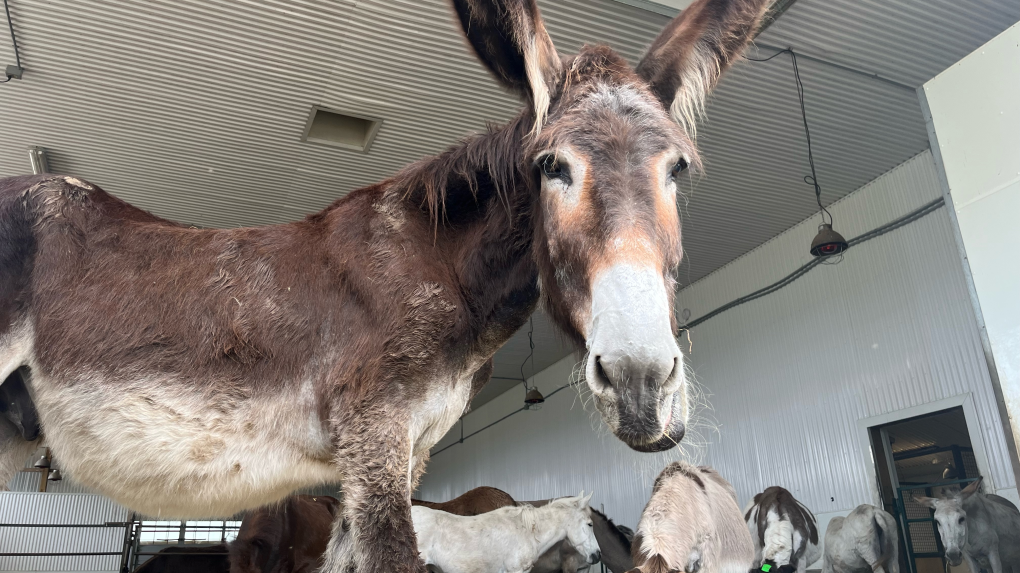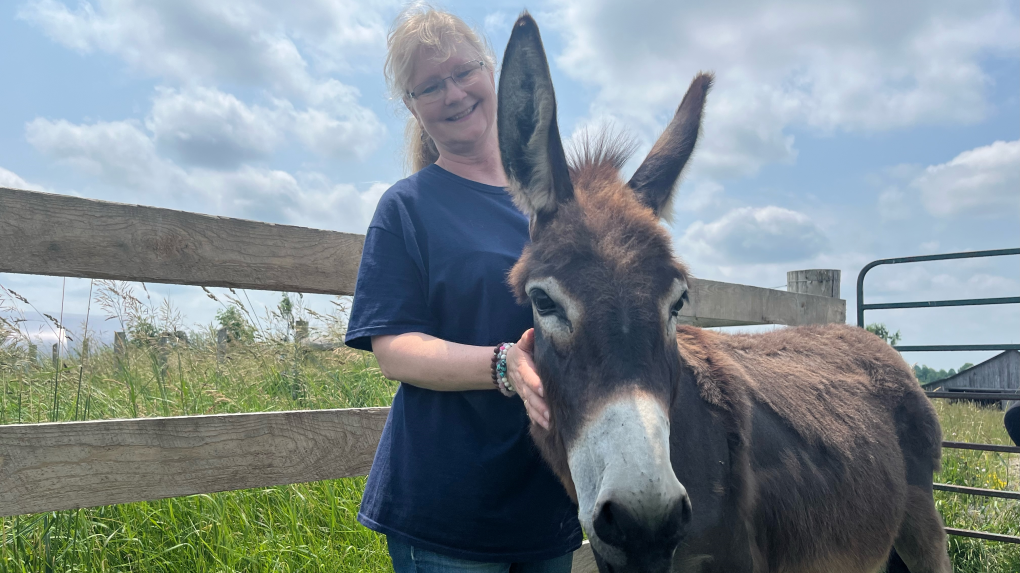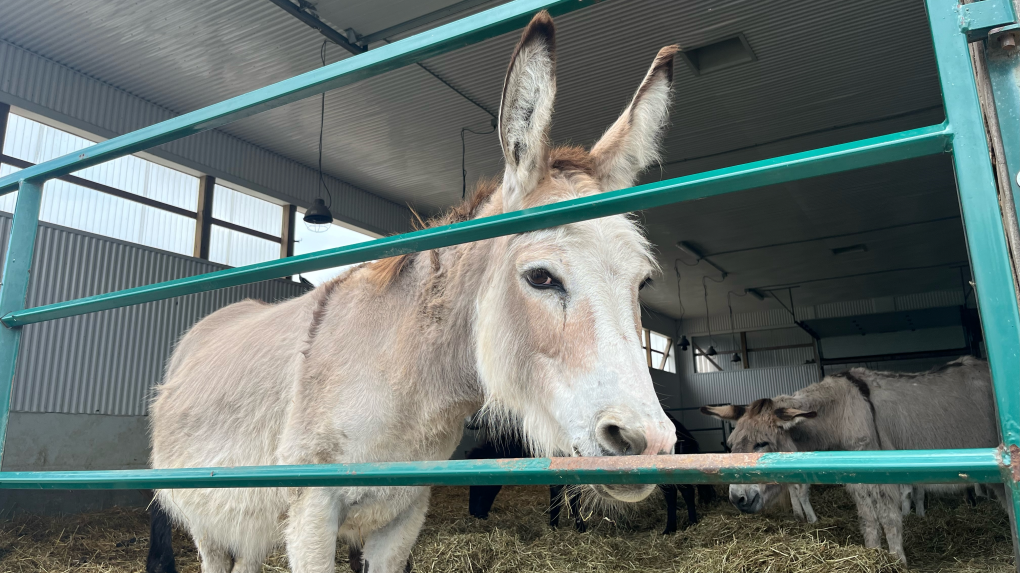Hidden Gem: This sanctuary gives donkeys and mules a new lease on life
This is part of an ongoing summer series. Come back each week to learn about another hidden gem.
The Donkey Sanctuary of Canada has been a safe space for surrendered or neglected animals for more than 30 years.
Located in Puslinch, Ont., the donkey and mule farm was started in 1992 by Sandra Pady.
“There were circumstances that led to Sandra taking in three donkeys and she absolutely fell in love with them,” executive director Janine Holman explained. “Not too long after this, there were other donkeys that she learned about in the area that were in need of rescue and in need of a good, loving and safe home. So she took in those donkeys as well.”
Pady was inspired by a donkey sanctuary in England, which prompted her to officially launch her own. It’s been a registered charity since 1992.
 The Donkey Sanctuary of Canada in Puslinch on June 20, 2024. (Stefanie Davis/CTV News)
The Donkey Sanctuary of Canada in Puslinch on June 20, 2024. (Stefanie Davis/CTV News)
Holman said there are many misconceptions about donkeys that the sanctuary works to combat through guided public tours and open house days.
“They’re what we refer to as the forgotten species,” she explained. “Over the millennium, donkeys have served mankind in so many ways, and over the millennium, they’ve been very mistreated.”
She described the animals as very gentle and stoic.
“It’s very peaceful being in the presence of a donkey,” Holman said. “There’s just a sense of goodness. There’s a sense of peace. Many people will say donkeys are stubborn or stupid, but they really are not. They’re very smart and that sense of stubbornness that we interpret is simply the donkey watching out for itself. Its sense of self-preservation comes through.”
 Janine Holman, the executive director of The Donkey Sanctuary of Canada, in Puslinch, Ont. on June 20, 2024. (Stefanie Davis/CTV News)
Janine Holman, the executive director of The Donkey Sanctuary of Canada, in Puslinch, Ont. on June 20, 2024. (Stefanie Davis/CTV News)
There are currently about 112 donkeys living at the sanctuary, with about 60 more who are living on “host farms.”
“That’s a specific group of farms that are qualified through our application process to be able to care for donkeys,” Kayla Johnson, host farm and education manager, said.
She explained that because the farm is limited on space, and some donkeys don’t thrive in a public atmosphere, host farms have been a way to give animals the most appropriate care.
“The only way that we can relieve space is by finding qualified homes in the community that can maybe support our mission by having one or two of our donkeys on the farm,” Johnson added. “I can’t say that the sanctuary isn’t the best place on earth, because I believe that it is. But at the same time, there’s many donkeys that exist here that have unique needs of care, even beyond group housing. Many donkeys who have come [are] very abused and maybe don’t enjoy the public open day setting.”
 The Donkey Sanctuary of Canada in Puslinch, Ont. on June 20, 2024. (Stefanie Davis/CTV News)
The Donkey Sanctuary of Canada in Puslinch, Ont. on June 20, 2024. (Stefanie Davis/CTV News)
While public education is a major part of what the sanctuary does, their priority remains the animals.
“I think that’s what makes us beautiful,” Johnson said. “Even as a public place for people to visit, we put the needs of the animals first.”
The sanctuary hosts its open houses on Sundays and guided tours can be booked separately.
A day specifically for seniors is scheduled on Tuesday, July 9.
Operating only on donations and admission fees, staff say they’re always happy to teach more people about donkeys and mules.
“Especially in this day and age, there seems to be such a disconnect between people and nature. This is a way to reconnect, and I think that’s very important,” Holman said. “Anybody who spends any time with donkeys will realize they’re pretty special creatures.”
CTVNews.ca Top Stories

Hong Kong police issue arrest warrants and bounties for six activists including two Canadians
Hong Kong police on Tuesday announced a fresh round of arrest warrants for six activists based overseas, with bounties set at $1 million Hong Kong dollars for information leading to their arrests.
U.S. president-elect's son shares post on X of Donald Trump buying Canada on Amazon
U.S. president-elect Donald Trump and those in his corner continue to send out strong messages about Canada.
What is flagpoling? A new ban on the practice is starting to take effect
Immigration measures announced as part of Canada's border response to president-elect Donald Trump's 25 per cent tariff threat are starting to be implemented, beginning with a ban on what's known as 'flagpoling.'
Economists say more room to fall as Canadian dollar continues downward trend
Experts say the next few months are going to be rough for the Canadian dollar as it appears set to continue its downward trend.
Heavy travel day off to a rough start after American Airlines briefly grounds all flights
American Airlines briefly grounded flights nationwide Tuesday due to a technical problem just as the Christmas travel season kicked into overdrive and winter weather threatened more potential problems for those planning to fly or drive.
How much is too much alcohol over the holidays? A doctor explains
The holidays are here, as are the parties, happy hours and other get-togethers that often offer abundant mixed drinks, beer and wine.
The Santa Awards: Ranking the best (and most ridiculous) Father Christmases ever to grace our screens
Behold, for your festive perusal, some of the most beloved, cherished and out-there onscreen renditions of dear old Saint Nick.
Trudeau could stay or go. Either way, Canadians should brace for a spring election
Canada appears to be barrelling toward a spring election now that the NDP is vowing to vote down the government early next year -- whether Prime Minister Justin Trudeau stays on or not.
Balkans snowstorm leaves tens of thousands of homes without power and causes traffic chaos
Tens of thousands of homes in Bosnia were without electricity on Tuesday after heavy snow and winds that also brought traffic chaos in neighbouring Croatia and Serbia.































